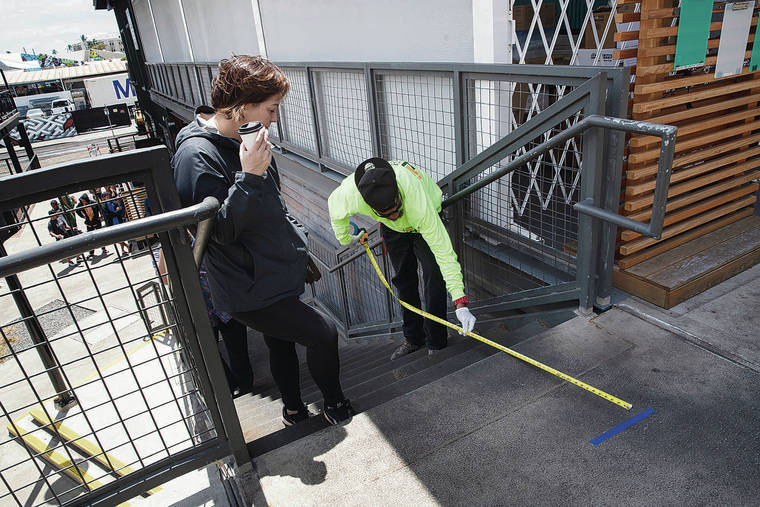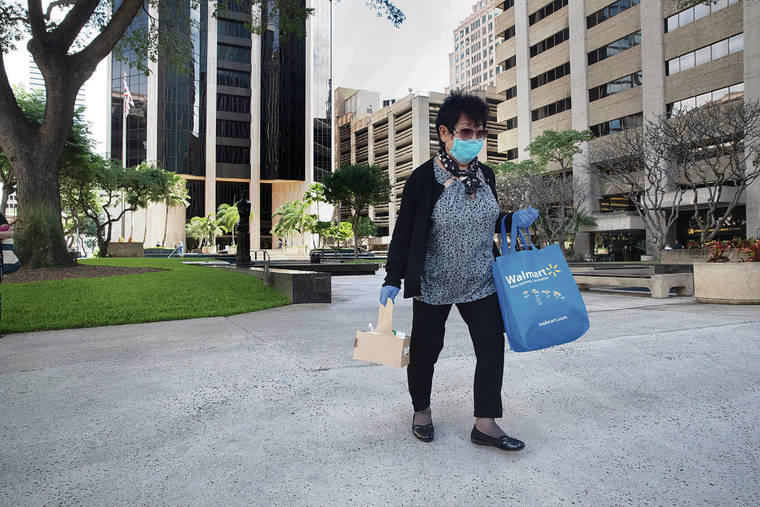Hawaii COVID-19 cases rise, death reclassified

GEORGE F. LEE / GLEE@STARADVERTISER.COM
Social distancing is key in preventing the spread of the coronavirus in Hawaii. The takeaway line for Butcher and Bird at Salt at Our Kakaako had varying degrees of social distancing at noon Tuesday. A Salt employee who had identified himself as Kawika Kawika put down blue tape markers 6 feet apart as a reminder to customers.

GEORGE F. LEE / GLEE@STARADVERTISER.COM
Bishop Street was nearly empty Tuesday as a lone pedestrian made her way across Tamarind Park.


A Maui health care worker was among 14 new cases of COVID-19 reported in Hawaii on Tuesday, and the state’s largest health system called for community donations of masks and other protective gear designed to help safeguard those on the front lines of the crisis.
The plea for masks, gloves, face shields and other personal protective equipment by The Queen’s Health Systems kindled fears that Hawaii’s hospitals are experiencing the same type of shortages felt by hard-hit medical facilities in New York and elsewhere on the mainland.
But state health officials insisted that Hawaii hospitals are in decent shape for now, having just received a shipment of 11 pallets of protective equipment from the Strategic National Stockpile, the nation’s largest supply of emergency pharmaceuticals and medical supplies, with another shipment on order.
Stacy Wong, communications manager of the Healthcare Association of Hawaii, said Monday’s shipment from the national stockpile is the second of two sent to the state, the first having arrived March 16. A third shipment is due this week.
“We have been satisfying hospital and overall health care coalition needs, including EMS and some of the community health centers. We are getting logistical help from the National Guard starting tomorrow, so that will help to push out even more, faster,” she said.
A Queen’s spokesman denied that its hospitals on Oahu, Molokai and Hawaii island are suffering from shortages. Instead, he said, the system is being as proactive as it can in anticipation of harder times if or when the global pandemic sweeps across the islands.
Don't miss out on what's happening!
Stay in touch with breaking news, as it happens, conveniently in your email inbox. It's FREE!
Cases grow
State health officials Tuesday said the state’s tally of coronavirus cases has risen to 90, up 14 from Monday.
The total initially was believed to have included Hawaii’s first coronavirus death, which was reported Monday. But on Tuesday night the state Department of Health reclassified the death formerly attributed to the coronavirus as negative for COVID-19, blaming the confusion on a report being misread.
The patient, who had underlying conditions, was an Oahu adult who died Friday. A second test of the patient’s samples came back negative for COVID-19 on Tuesday night.
DOH Director Bruce Anderson said the state’s focus was on getting information out in a timely manner.
“This is an unprecedented situation and we’re still developing best practices,” Anderson said. “I accept all responsibility for not verifying reporting procedures. We’re immediately instituting measures to ensure this doesn’t happen again. My condolences to the family and friends of the person who passed away and our apologies for any undue anxiety this caused.”
Swabs from the person were submitted to the state laboratories two days after the person died, the Health Department said. They previously were tested by a private clinical lab, with inconclusive results.
Of the confirmed cases in Hawaii since the start of the outbreak, six have required hospitalization. Tuesday’s count included 58 cases on Oahu, nine on Maui, two on the Big Island and one on Kauai. Six cases are pending identification of the county of residence, according to the Department of Health.
Health officials updated how they count the numbers, noting that 11 cases are U.S. citizens who are not Hawaii residents, and three cases are international residents. The new tally did not specify where in the islands these non-Hawaii residents are.
Officials announced 77 total cases Monday but said Tuesday that one of those cases was duplicated so that the 14 new cases Tuesday increased the total to 90. Officials could not be reached Tuesday night to determine whether the declassification affected the total.
Among those testing positive for COVID-19 is a driver of TheBus who has not operated a city bus since returning from the mainland last week, a city official confirmed Tuesday.
Jon Nouchi, the city’s deputy director of transportation services, said the bus operator returned to Oahu on March 17 and self-reported his situation to Oahu Transit Services, the company that holds the contract to operate TheBus for the city.
“The person appeared to have contracted the virus from travel and did not ever return to work since contracting the virus,” Nouchi said. “So as far as we know, the bus driver never had the opportunity to expose the virus to the public.”
On the front lines
Elsewhere on Tuesday, officials at Maui Health, owner of Maui Memorial Medical Center and other health care operations on Maui and Lanai, announced today that one of its employees tested positive for COVID-19, and said the person “is in good condition and is isolated to prevent the spread of infection to others.”
State Epidemiologist Dr. Sarah Park urged Hawaii residents to do what they can to help Hawaii’s health care professionals maintain their health supplies.
“They are the ones who we are going to rely on as this pandemic continues to take care of all of us,” Park said.
State Health Director Bruce Anderson said that while the hospitals are generally in good shape for protective equipment, Hawaii’s private physicians are feeling the pinch.
“All physicians are dealing with this issue, and they are on the front lines for protecting us and identifying new cases,” he said.
Wong conceded that not all the needs of Hawaii’s health care community are being met, but “we are continuing to push all available channels to obtain more supplies.”
Mylene Reyes, owner of Oahu-based medical supply firm R&M Reyes Enterprises, said her small company is having trouble keeping up with demand for masks, gloves and other supplies.
And it’s not just the medical field, she said. A nonprofit reached out to the company for masks and gloves for preparing meals, saying it couldn’t find a supplier. Reyes said her company was unable to help.
“Everything is going to the hospitals,” she said.
China has a huge stockpile of masks, Reyes said, and once it releases its supply, the hysteria will die down and they will be plentiful again.
Dr. Kai Matthes, a Maui Health anesthesiologist, said he was not surprised one of his colleagues caught the coronavirus, because “it was expected sooner or later.”
Matthes said anesthesiologists are among the most vulnerable of medical workers, and he had come down with a cough and was tested for coronavirus.
The test came out negative for Matthes, one of more than 100 physicians from across the state who sent a letter last week to Hawaii authorities urging a shelter-in-place order.
But for the most part, he said, Maui Memorial Medical Center has been taking good care of the staff as far as protective equipment and supplies are concerned.
“The hospital understands the urgency of the situation. They understand the possible threat and we are prepared,” Matthes said. “Now it’s just a matter of waiting to see what happens. If the people take the emergency rules seriously, that’s good. It helps to reduce the risk and not overwhelm the health system.”



